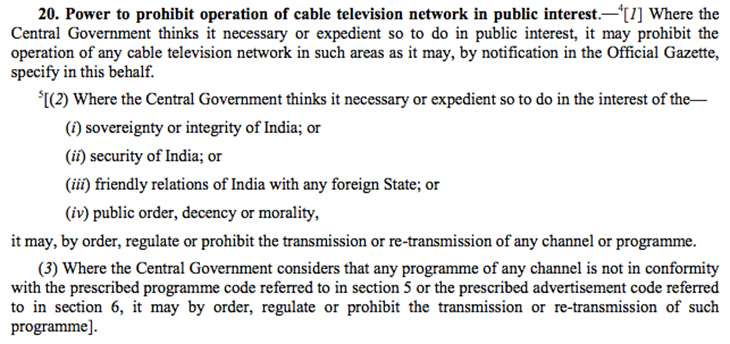NDTV ban: Why must government play judge, jury & executioner?

The one-day broadcast ban imposed by the union government on NDTV India is a classic case that gives an insight into the mindset of the Narendra Modi government. It is also a good opportunity for the media community, and the television news community specifically, to demand for revisiting a law that has been amply proved to be draconian.
The Cable Television Networks (Regulation) Act, 1995 empowers the government to prohibit the transmission of any channel.
While the basis of the NDTV-ban appears to be amendments to the original law that were brought about in 2015, the provision that enables prohibition has existed since 1995.
The new amendments only brought about a new condition - that any programme which contains live coverage of any anti-terrorist operation by security forces should not be broadcast.

As NDTV has argued, and other media organisations have also recounted, several other channels, as well as newspapers, had given out the information that only NDTV has been accused of showing.
Why single out NDTV then? The reasons are best known only to the government, but the ban does appear to be a message - a trial balloon floated to test waters.
Arbitrary clause
The point to ponder upon is why does the government have this unbridled power to prohibit the transmission of a channel whenever it "thinks it necessary or expedient to do so"?
Why can't the government approach the courts in such matters, by filing a case under relevant provisions against any channel which it deems guilty? Why should the government play judge, jury and executioner?
The NDTV incident has shown the danger of this provision of the Cable TV Act. What it essentially does is that it gives the government immense power to tighten the screws on media outlets that it has a bone to pick with.
It is not clear whether the provision was opposed or not when the Act was being debated in the Parliament, but it has not attracted significant scrutiny so far is because it was never imposed on the grounds of national security.
There have been other incidents in the past in which previous governments have imposed a ban on telecast of several other channels. On most of these occasions, 'decency' or 'morality' have been cited as a ground, which is in itself a debatable proposition. But the NDTV incident seems to be a different game altogether.
A nationalist conspiracy?
BJP and Modi have been playing the national security drama for a long time. Several dubious encounters were orchestrated by the police in Gujarat when Modi was chief minister and all questions raised were brushed under the carpet invoking grounds of national security.
Modi visited Mumbai after the 26/11 attacks of 2008 and assailed the UPA government for not being unable to keep the country safe from terror.
Modi built his electoral campaign for 2014 majorly on grounds of national security by regularly accused the UPA government of being soft towards Pakistan.
After coming to power, even though his government has been unable to deter Pakistan, purported 'surgical strikes' along the LoC were announced and the BJP went to town showing-off the strikes as the mark of a strong government. The attacks from across the border have only gone up since.
Modi and his ministers have repeatedly harped on a vague 'nation-first' principle and have used it to drown out Opposition voices on a gamut of issues.
Only recently, the PM himself invoked the 'nation-first' expression during his keynote address on the role of media at the Ramnath Goenka Awards.
It is such a favourite with the BJP that the possibility of using it as an excuse to unleash a clampdown on freedom of media is not beyond contemplation.
The NDTV ban could have well been imposed to signal that the government will not tolerate hostile media coverage.
Judicial scrutiny?
It has reliably been learnt that NDTV has moved the Supreme Court against the government order. How the apex court will respond depends upon several factors.
A senior SC advocate who has also been a former Additional Solicitor General told Catch that the evidence furnished by the government against NDTV will be central to the arguments.
He explained that if there is video evidence showing clearly that the channel telecasted any part of the anti-terror operation at Pathankot live, then it will be hard to challenge the constitutionality of the ban.
He recalled that the SC had been very critical of live media coverage of security forces' action during the 26/11 attacks. However, the senior advocate added, if the channel had merely reported facts that were already in public domain, then the ban could be dubbed excessive.
Former SC judge and former Chief of the Press Council of India Markandey Katju feels that the ban is illegal because the prohibition is only on "live coverage" of anti-terrorist operations by the security forces", which means "showing scenes of security forces searching or pursuing terrorists, or fighting with them."
He maintained that "NDTV had only reported about anti-terrorist operations, but had not shown any scenes of security forces chasing or fighting with terrorists."
Larger reform
NDTV's case will be one fight that the entire media community will have to take up and not stop only at demanding reversal of the present ban.
The real demand in the interest of media freedom and freedom of speech and expression would be to either ask the SC to strike down the provision of the Cable TV Act that empowers the government to ban channels or petition the Parliament to amend the Act and remove this section.
It was a mistake to allow the provision to have entered the statute books in the first place and it's high time it was scrapped.
Edited by Jhinuk Sen
First published: 5 November 2016, 7:39 IST






![BJP's Kapil Mishra recreates Shankar Mahadevan’s ‘Breathless’ song to highlight Delhi pollution [WATCH] BJP's Kapil Mishra recreates Shankar Mahadevan’s ‘Breathless’ song to highlight Delhi pollution [WATCH]](https://images.catchnews.com/upload/2022/11/03/kapil-mishra_240884_300x172.png)

![Anupam Kher shares pictures of his toned body on 67th birthday [MUST SEE] Anupam Kher shares pictures of his toned body on 67th birthday [MUST SEE]](https://images.catchnews.com/upload/2022/03/07/Anupam_kher_231145_300x172.jpg)






